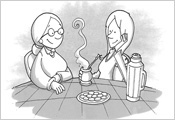2011 John Kendrew Young Scientist Award
‘Publish or perish’ is the mantra for many young researchers, but it was publishing of a very different kind that helped earn Amaicha Depino the John Kendrew Young Scientist Award for 2011.
Since completing her EMBL postdoc in the Gross Group at Monterotondo (2004–2006), Amaicha has, with limited resources, created a mouse behavioural facility, published six peer-reviewed neuroscience articles, and taught at the University of Buenos Aires. But it is her success communicating science to audiences including Argentinian children, politicians, journalists and her own neuroscience colleagues that won her this year’s award.
‘My grandmother the lettuce’

In 2009 Amaicha won first prize in a national science communication contest organised by ArgenBio for her educational story My Grandmother the Lettuce, which illustrated basic concepts of agro-abiotechnology. This was later illustrated and published to be distributed for free to science teachers.

Amaicha has since been commissioned by publishing company Iamique to write a series of books for children explaining forensic science, beginning with the publication in 2010 of The detective Intringulis and the theft of the Mona Luisa, which explains the concepts of twins and their fingerprints, the physiology of lying, and the science of art authentication.
Committed to communication
Amaicha’s interest in writing about science began as a student: “Being the only scientist in my family, and only the second generation to study at university, trying to explain to friends and family what I was studying made me realise the difficulties in communicating this specific knowledge. So, as a student, I began writing articles about science.”
“When I went to EMBL, I learnt about all the different efforts made by the laboratory to communicate science,” reveals Amaicha. “Some scientists consider it a waste of time, some journalists consider that scientists are not properly prepared for writing, so seeing that EMBL made efforts to communicate their science was really encouraging.”
From pen to pipette
Amaicha’s list of achievements is impressive. In 2007 she helped give Argentinian journalists, politicians and businessman a ‘hands-on’ introduction to biology and genetics in the first Workshop on Genetic Engineering for Opinion Leaders.
In 2008, she won €4000 funding to organise the 10th Argentine Neuroscience Workshop, and subsequently arranged monthly ‘neurodinners’ for young neuroscientists to debate relevant topics.
Amaicha honed her communication skills further while sponsored on a medical and environmental communication programme at the University Pompeu Fabra. In 2009, she won a young investigator position and started her own group investigating animal models of autism at the Institute of Physiology, Molecular Biology and Neurosciences, CONICET – Faculty of Exact and Natural Sciences, University of Buenos Aires.
Spreading the word
“This recognition will help me keep doing what I’m doing: fostering the development of more science communication projects and the involvement of more scientists in these projects,” says Amaicha of receiving the John Kendrew Award. “It would be nice to see the whole science community take the communication of science as their responsibility, shared with teachers and journalists.”
“I also hope it will help me in my aspiration to foster international collaborations in science communication between Argentina and Europe, by helping me put collaborations in motion, including the exchange of ideas, projects and efforts.”
Amaicha visited EMBL Heidelberg on Lab Day (Friday, 10 June, 2-3pm) to receive her award from her former group leader Cornelius Gross.